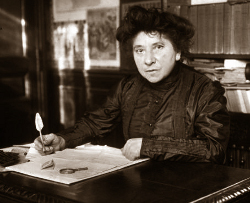The women’s suffrage movement in France took a lot longer to reach its goal than did the movements in Britain and the U.S.. Women could not vote on par with men in France until . I haven’t seen many examples of tax resistance being used as a tactic by French suffragists — a couple from that were mentioned in The Vote is all. But here is a brief note from that shows the movement there had its “no taxation without representation” activists:
Paris women are beginning to assert their “rights.” Mlle. Hubertine Auclerc [sic] refuses to pay her taxes unless she is allowed to vote…
Mlle. Hubertine Auclert, the French woman who wants her rights, has served written notice on the Prefect of the Seine that as she is not allowed to vote she is not going to pay taxes. So long as she is denied a voice in determining the use to be made of her money, she prefers and intends to keep it in her own pocket. “If I have no rights,” she says. “It follows that I have no responsibilities. I do not vote. I do not pay.” Seven other ladies, three of them widows, join Mlle. Hubertine in this notification. One of the Paris newspapers remarks that this stroke of strategy is original with Mlle. Hubertine: that neither in England nor America has it occurred to any member of the disfranchised sex to refuse to pay her taxes. Evidently this Paris editor never heard of the Glastonbury cows.
Here is another brief note from :
Mademoiselle Hubertine Auclert, the notorious advocate of Woman’s Rights, appeared in person before the Council of the Perficture of the Seine, demanding exemption from payment of taxes. Her argument was that, as women are allowed no voice in the government of the country, they ought not to bear any of the expense. It is needless to say that Mdlle. Auclert’s application was rejected.
, an American women’s suffrage magazine called The National Citizen and Ballot Box carried this brief article:
“Les Femmes Qui Tuent et Les Femmes Qui Votent.”
by Alexandre Dumas
Or, Woman Suffrage as a Means of Moral Improvement and Prevention of Crime
[Extracts from the above book, translated by Thos. Mott, the only son of Lucretia Mott.]
In the moral world, as in the physical, everything is logical and progressive. We see the practical claims of women advance with her moral improvement and soon these new ideas will take shape and become incarnate as indeed, already appears.
An advocate of woman suffrage, Miss Hubertine Auclert, refused lately to pay taxes, urging that as women are not allowed to vote, it was unjust that they should be taxed, that in imposing upon them the same responsibilities as upon men, they are entitled to the same rights, and she demands for women the right to the ballot.
Of course she is ridiculed. The furniture of Miss Auclert was seized, and the majesty of the law was sustained against her vain protests.
Among Auclert’s other claims to fame is that she invented the term “féministe” to refer to women’s rights proponents.

